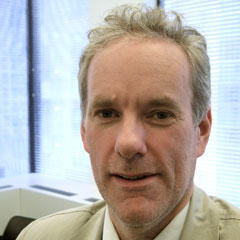Philosophy Professors Start New WCER Interdisciplinary Center for Ethics and Education
December 19, 2014

Harry Brighouse
What are the purposes of public education? Are they the right kinds of purposes now, and were they the right kinds of purposes 50 years ago?
Questions like this will be addressed by WCER’s new interdisciplinary Center for Ethics and Education, codirected by Harry Brighouse, a philosophy professor and an affiliate professor of educational policy studies at the University of Wisconsin-Madison, and Anthony Laden, a professor of philosophy at the University of Illinois at Chicago.
The center will link a group of senior scholars working on philosophical issues in education, either in their philosophy departments or in their schools of education, or both. Economists, sociologists, psychologists, and anthropologists will be invited to participate as well.
WCER’s new center will focus on three broad areas of research:
political philosophy (the place and role of educational institutions and resources);
philosophy of social science questions that arise in educational research; and,
ethical and conceptual questions concerning teaching, learning, and classroom practice.
Brighouse’s own research is framed by what he calls an egalitarian theory of educational justice. He focuses on school reform and school choice, democratic schools, and small schools. He also serves on the editorial board of the journal Theory and Research in Education.
WCER’s new center will encourage and promote research at the intersection of philosophy and education. “Philosophy of education is a small field,” Brighouse says. “Chances are there are only one or two people on any given campus with that interest, so there’s a problem of getting people to have a sense of cohort.”
Despite the relatively small number of scholars in this field, Brighouse says that educational policy and practice provide rich material for philosophical reflection. Policymakers and practitioners could benefit from the arguments and insights provided by philosophers. Yet relatively little serious work has been done in philosophy departments on issues in education, and little training in philosophy has been provided to experts in educational policy and practice.
As a result, he says, we lack the human and institutional capital to produce the kind of quality work that requires combining deep institutional and practical knowledge of educational policy making, teaching experience, and the analytical skills and intellectual background afforded by education in moral and political philosophy.
The best way to achieve this kind of broader impact, Brighouse says, is to establish an independent center at a university. WCER’s new center will serve as an active, visible presence that conveys a tangible and significant commitment to the exploration of ethics and education. It also will provide a focus for seeking funding from other foundations and individuals to complement its five years of startup support from the Spencer Foundation.
The center will serve as a base for distributing instructional materials, working papers, and related aids to learning. Its programs will foster the further development of, interest in and capacity for high-level philosophical work on educational issues.
The center’s five principal activities will be:
- funding a competitive program of small grants to support strong scholarly work;
- offering a summer institute for graduate students every other year on the philosophy of education;
- funding graduate students through a set of awards and prizes for promising work;
- hosting biannual conferences that bring together senior fellows and grantees around particular topics and problems. For example, the intergenerational transmission of inequality, issues of measurement and educational quality; and the ethics of teaching; and
- developing curricular materials for use in schools of education and public policy, and departments of philosophy and political science.
More about the new center here: http://news.ls.wisc.edu/announcements/new-philosophy-center-to-focus-on-educational-policy/


